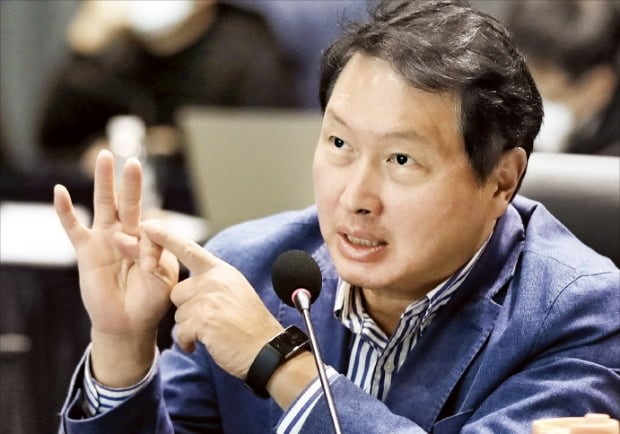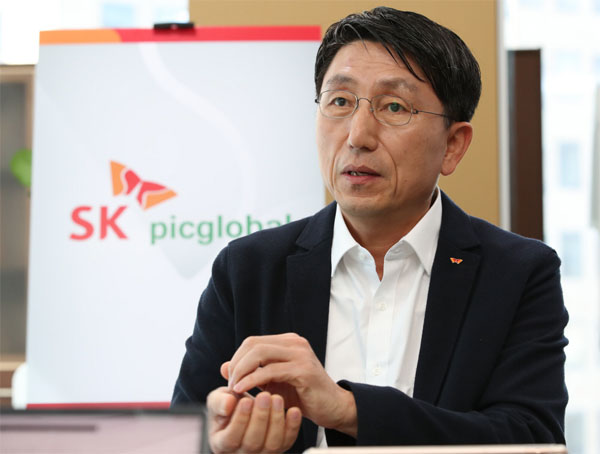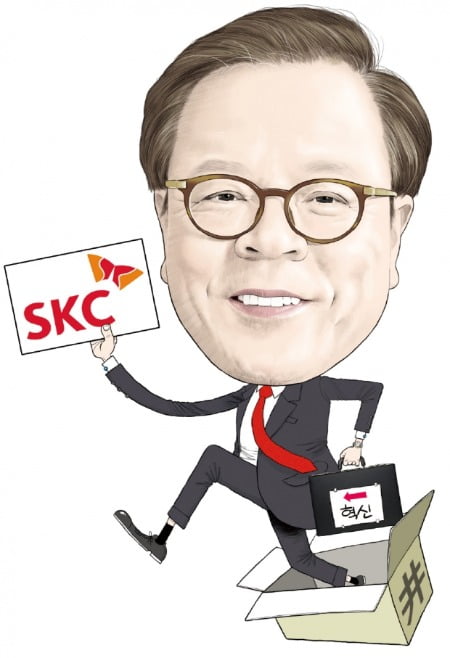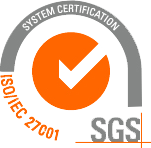홈
Communication
PR
Focus SKC
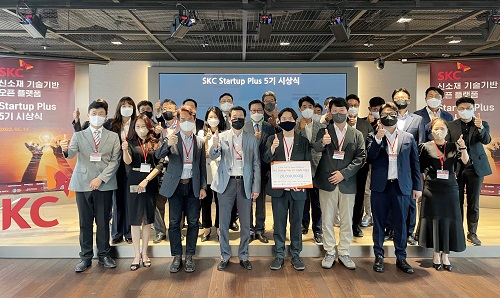 "Technology is the Breakthrough"… SKC plants the seeds of technology to raise industrial sustainability.
"Technology is the Breakthrough"…SKC plants the seeds of technology to raise industrial sustainability[ESG Showcase 2022] SMEs and joint ventures show growth based on SKC’s Open Platform for New Materials and Startup Plus.An employee is at the shatter-proof film production line of SKC hi-tech&marketing Cheonan Plantlocated at Cheonan-si, Chungcheongnam-do. / Image from SKCSKC truly represents South Korea as a company specialized in chemical materials used for various fields including the following: rechargeable battery materials such as electric foils for EV, ESS (energy storage system) and other IT devices; chemical materials such as insulators and lubricants for cars, cosmetics and home appliances; and, industrial materials such as optical packaging and other semiconductors.Starting from the self-development and mass production of polyester film in 1977, SKC continued to make remarkable achievements being the first in South Korea to succeed in the commercial production of PO (propylene oxide) and also being the first in the world to succeed in the commercialization of HPPO, an eco-friendly PO production process using hydrogen peroxide. More recently, the company is preparing to become the first in the world to commercialize glass substrate for low power, high performance semiconductors.While SKC is now known as a materials company widely acknowledged both at home and abroad, the early days of polyester film development was a time of discouragement due to the cold response from companies that already had related technologies. Building upon the research & development efforts that went on for almost 50 years, SKC has been seeking ways to support joint ventures and startups in the materials industry so that their ideas can be turned into a business. SKC itself has made arrangements to meet numerous organizations to explain its plans to create an open platform and invited their participation. As a result, the Open Platform for New Materials was established on September 2017 through an MOU (memorandum of understanding). The project was joined by 17 specialty organizations including SKC, Korea Institute of Science and Technology, Office Strategic R&D Planning, Deloitte Korea, Korea Technology Finance Corporation and Shin & Kim.The Open Platform for New Materials (the “Open Platform”) is performing a number of roles including: providing support for commercialization in connection with nationwide projects; matching technologies in demand with companies that need the technologies; providing specialized advice on the engineering and technology fields; offering technology valuation and specialized consulting; and, providing financial and legal advice. It is thus intended by SKC to make a contribution to capability building on sustainable industrial ecosystem management by providing support for technological development of SMEs because this is what SKC is good at.In the early days, the main participants of the Open Platform were joint ventures and startups from Ulsan, the base of SKC’s chemical business. In 2018, however, the SKC Startup Plus contest became open for nationwide competition, inviting more and more joint ventures and startups from all parts of the country to participate in the Open Platform. The participating companies’ business areas were also expanded to the materials field whereas IT was formerly the dominant field. The number of companies selected in the Startup Plus was five at first, ten in 2019 and sixteen in 2020, which was again reduced to five since 2021 in an aim to focus on a small group of companies.An SKC executive said, "We originally invited high performance and high value companies across the industrial materials sector but, from this year, we have limited the participation to companies that are related to SKC’s key business areas, i.e., mobility, semiconductors and eco-friendly materials," and further explained, "It is because SKC will be able to offer more practical help if the companies are doing business in areas SKC knows well and has the technological expertise.”This year, five companies were selected as follows: Cuprum Materials, specialized in next-generation materials for 5G 28㎓ communication boards; Killington Materials with an energy-saving production technology of rechargeable battery anode materials; Terra Block which manufactures high purity, recycled materials through plastic waste depolymerization; Chemaltech which is engaged in the development of non-phosphorus corroding materials for 3D NAND flash; and, 119 REO which specializes in firefighter suit upcycling. It is notable in particular that 119 REO was the first company to be selected as a soon-to-be social enterprise. Some other major companies that gained attention in the Open Platform and Startup Plus include: Chemifolio with technology to extract Cardanol, 100% eco-friendly material from cashew nut shell; Nopion which has developed a self-assembly anisotropic conductive adhesive that can overcome the limitations of ever-miniaturizing circuit interconnection; and, Marine Innovation which is an eco-friendly materials development company using marine plants.A total of 198 companies so far have participated in the Open Platform including the companies selected for Startup Plus. Average sales of these companies have increased from KRW 32.9 billion to KRW 60.0 billion and their average number of employees have also increased to 680, twice the former average of 360. These results show that SMEs, joint ventures and startups can achieve stable growth based on their technological competitive edge.SKC is also striving to improve supply chain stability by establishing a supply chain that reflects social value such as: support for capability improvement of partner companies; green purchase policy and eco-friendly product buying; ESG risk management of partner companies; and, partner company selection by indexing their social values and reflecting them in the assessment.In the meanwhile, SKC is attending the ESG Showcase 2022 at Orchid Room, Western Josun Seoul at Sogong-dong, Seoul on July 14 hosted by Money Today and sponsored by Korea Exchange, Korea Financial Investment Association and KBIZ Korea Federation of SMEs. The Showcase’s theme is ‘In Search of Sustainable Industrial Ecosystem Management in South Korea,’ and SKC is presenting efforts that have been focused on providing support for SMEs to improve their capabilities of sustainable industrial ecosystem management.https://news.mt.co.kr/mtview.php?no=2022071015310163967
2022-07-11
"Technology is the Breakthrough"… SKC plants the seeds of technology to raise industrial sustainability.
"Technology is the Breakthrough"…SKC plants the seeds of technology to raise industrial sustainability[ESG Showcase 2022] SMEs and joint ventures show growth based on SKC’s Open Platform for New Materials and Startup Plus.An employee is at the shatter-proof film production line of SKC hi-tech&marketing Cheonan Plantlocated at Cheonan-si, Chungcheongnam-do. / Image from SKCSKC truly represents South Korea as a company specialized in chemical materials used for various fields including the following: rechargeable battery materials such as electric foils for EV, ESS (energy storage system) and other IT devices; chemical materials such as insulators and lubricants for cars, cosmetics and home appliances; and, industrial materials such as optical packaging and other semiconductors.Starting from the self-development and mass production of polyester film in 1977, SKC continued to make remarkable achievements being the first in South Korea to succeed in the commercial production of PO (propylene oxide) and also being the first in the world to succeed in the commercialization of HPPO, an eco-friendly PO production process using hydrogen peroxide. More recently, the company is preparing to become the first in the world to commercialize glass substrate for low power, high performance semiconductors.While SKC is now known as a materials company widely acknowledged both at home and abroad, the early days of polyester film development was a time of discouragement due to the cold response from companies that already had related technologies. Building upon the research & development efforts that went on for almost 50 years, SKC has been seeking ways to support joint ventures and startups in the materials industry so that their ideas can be turned into a business. SKC itself has made arrangements to meet numerous organizations to explain its plans to create an open platform and invited their participation. As a result, the Open Platform for New Materials was established on September 2017 through an MOU (memorandum of understanding). The project was joined by 17 specialty organizations including SKC, Korea Institute of Science and Technology, Office Strategic R&D Planning, Deloitte Korea, Korea Technology Finance Corporation and Shin & Kim.The Open Platform for New Materials (the “Open Platform”) is performing a number of roles including: providing support for commercialization in connection with nationwide projects; matching technologies in demand with companies that need the technologies; providing specialized advice on the engineering and technology fields; offering technology valuation and specialized consulting; and, providing financial and legal advice. It is thus intended by SKC to make a contribution to capability building on sustainable industrial ecosystem management by providing support for technological development of SMEs because this is what SKC is good at.In the early days, the main participants of the Open Platform were joint ventures and startups from Ulsan, the base of SKC’s chemical business. In 2018, however, the SKC Startup Plus contest became open for nationwide competition, inviting more and more joint ventures and startups from all parts of the country to participate in the Open Platform. The participating companies’ business areas were also expanded to the materials field whereas IT was formerly the dominant field. The number of companies selected in the Startup Plus was five at first, ten in 2019 and sixteen in 2020, which was again reduced to five since 2021 in an aim to focus on a small group of companies.An SKC executive said, "We originally invited high performance and high value companies across the industrial materials sector but, from this year, we have limited the participation to companies that are related to SKC’s key business areas, i.e., mobility, semiconductors and eco-friendly materials," and further explained, "It is because SKC will be able to offer more practical help if the companies are doing business in areas SKC knows well and has the technological expertise.”This year, five companies were selected as follows: Cuprum Materials, specialized in next-generation materials for 5G 28㎓ communication boards; Killington Materials with an energy-saving production technology of rechargeable battery anode materials; Terra Block which manufactures high purity, recycled materials through plastic waste depolymerization; Chemaltech which is engaged in the development of non-phosphorus corroding materials for 3D NAND flash; and, 119 REO which specializes in firefighter suit upcycling. It is notable in particular that 119 REO was the first company to be selected as a soon-to-be social enterprise. Some other major companies that gained attention in the Open Platform and Startup Plus include: Chemifolio with technology to extract Cardanol, 100% eco-friendly material from cashew nut shell; Nopion which has developed a self-assembly anisotropic conductive adhesive that can overcome the limitations of ever-miniaturizing circuit interconnection; and, Marine Innovation which is an eco-friendly materials development company using marine plants.A total of 198 companies so far have participated in the Open Platform including the companies selected for Startup Plus. Average sales of these companies have increased from KRW 32.9 billion to KRW 60.0 billion and their average number of employees have also increased to 680, twice the former average of 360. These results show that SMEs, joint ventures and startups can achieve stable growth based on their technological competitive edge.SKC is also striving to improve supply chain stability by establishing a supply chain that reflects social value such as: support for capability improvement of partner companies; green purchase policy and eco-friendly product buying; ESG risk management of partner companies; and, partner company selection by indexing their social values and reflecting them in the assessment.In the meanwhile, SKC is attending the ESG Showcase 2022 at Orchid Room, Western Josun Seoul at Sogong-dong, Seoul on July 14 hosted by Money Today and sponsored by Korea Exchange, Korea Financial Investment Association and KBIZ Korea Federation of SMEs. The Showcase’s theme is ‘In Search of Sustainable Industrial Ecosystem Management in South Korea,’ and SKC is presenting efforts that have been focused on providing support for SMEs to improve their capabilities of sustainable industrial ecosystem management.https://news.mt.co.kr/mtview.php?no=2022071015310163967
2022-07-11
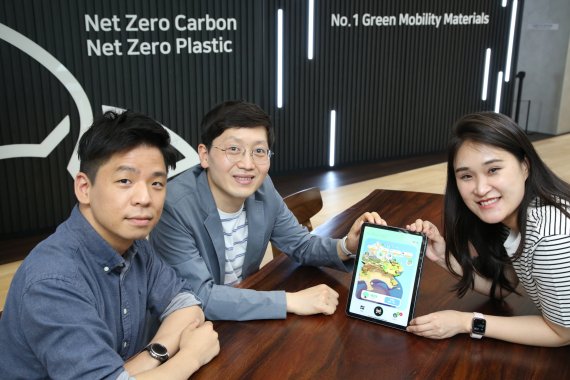 “Recycling instructions are included in the barcodes that are attached to plastic containers.”
“Recycling instructions are included in the barcodes that are attached to plastic containers.”SKC ESG BM Promotion Team of Seong-min Kim, Hee-won Song and Chan-shik LeeEco-friendly plastic platformMy Green Place Management TeamGuidelines for complicated plastic sortingUsing barcode reader for easy recyclingSKC ESG BM Promotion Team Leader Seong-min Kim (in the center) is running My Green Place appwith Manager Chan-shik Lee (on the left) and Manager Hee-won Song (on the right). / Image from SKC"I looked at PET drink bottles and thought hard for a long while. Then, I realized that all bottles had in common a barcode. I was like, this is it!”Seong-min Kim is the Team Leader of SKC ESG (Environment, Society, Governance) BM Promotion Team and in charge of the eco-friendly plastic platform My Green Place, and this is how his team developed the first app to adopt the plastic barcode reader among other petrochemical companies. The idea that came from Manager Hee-won Song, in the same team, was conceived based on the QR code that has become familiar to people nationwide.It took two full years for Team Leader Seong-min Lim, Manager Hee-won Song and Manager Chan-shik Lee in the SKC ESG BM Promotion Team to officially launch My Green Place.Although they did not write the codes themselves, they participated in the entire development process from the concept phase, through development to marketing. They recruited 1,000 eco-moms (housewives who practice environment protection in their daily life) and MZ generation volunteers early last year for the pilot testing. The reaction was hot.Of course, there was trial and error at first. Kim said, “Actually, in the beginning, we wanted to move to a metaverse concept, but we soon judged that it would be pushing ourselves too far to go for metaverse due to limited development costs and environment.”Instead, a game concept was taken. Lee said, “Well, recycling has almost no fun element. When we first developed the app, we really thought a lot about fun elements.” When a user opens the app and simply enter his/her username, My World is displayed. Here, the user can use the barcode reader at the bottom to get details of each plastic such as components and recycling instructions.Such activities will generate points and the user can plant trees, grass, etc. and raise fairies of light, earth, water and happiness. The team plans to expand this world view later into the universe and deep sea.However, fun is not the only thing they sought. They received guidelines from the Ministry of Environment to ensure accuracy and expertise of the information and also had the information reviewed by the Korea Waste Association and professors in the relevant field.BM Promotion Team’s further goal is to increase consumer participation. For this, they are working to add elements such as challenges that will encourage consumer participation.Kim said, "Consumers can report information about plastics not available in the app, so it will further be improved as the reports are added and data is accumulated,” and continued to say, “More and more people around me are already telling me that they will use the app to teach their children.”Reporter: Joon-ho Gwonhttps://www.fnnews.com/news/202205011858253406
2022-05-01
“Recycling instructions are included in the barcodes that are attached to plastic containers.”
“Recycling instructions are included in the barcodes that are attached to plastic containers.”SKC ESG BM Promotion Team of Seong-min Kim, Hee-won Song and Chan-shik LeeEco-friendly plastic platformMy Green Place Management TeamGuidelines for complicated plastic sortingUsing barcode reader for easy recyclingSKC ESG BM Promotion Team Leader Seong-min Kim (in the center) is running My Green Place appwith Manager Chan-shik Lee (on the left) and Manager Hee-won Song (on the right). / Image from SKC"I looked at PET drink bottles and thought hard for a long while. Then, I realized that all bottles had in common a barcode. I was like, this is it!”Seong-min Kim is the Team Leader of SKC ESG (Environment, Society, Governance) BM Promotion Team and in charge of the eco-friendly plastic platform My Green Place, and this is how his team developed the first app to adopt the plastic barcode reader among other petrochemical companies. The idea that came from Manager Hee-won Song, in the same team, was conceived based on the QR code that has become familiar to people nationwide.It took two full years for Team Leader Seong-min Lim, Manager Hee-won Song and Manager Chan-shik Lee in the SKC ESG BM Promotion Team to officially launch My Green Place.Although they did not write the codes themselves, they participated in the entire development process from the concept phase, through development to marketing. They recruited 1,000 eco-moms (housewives who practice environment protection in their daily life) and MZ generation volunteers early last year for the pilot testing. The reaction was hot.Of course, there was trial and error at first. Kim said, “Actually, in the beginning, we wanted to move to a metaverse concept, but we soon judged that it would be pushing ourselves too far to go for metaverse due to limited development costs and environment.”Instead, a game concept was taken. Lee said, “Well, recycling has almost no fun element. When we first developed the app, we really thought a lot about fun elements.” When a user opens the app and simply enter his/her username, My World is displayed. Here, the user can use the barcode reader at the bottom to get details of each plastic such as components and recycling instructions.Such activities will generate points and the user can plant trees, grass, etc. and raise fairies of light, earth, water and happiness. The team plans to expand this world view later into the universe and deep sea.However, fun is not the only thing they sought. They received guidelines from the Ministry of Environment to ensure accuracy and expertise of the information and also had the information reviewed by the Korea Waste Association and professors in the relevant field.BM Promotion Team’s further goal is to increase consumer participation. For this, they are working to add elements such as challenges that will encourage consumer participation.Kim said, "Consumers can report information about plastics not available in the app, so it will further be improved as the reports are added and data is accumulated,” and continued to say, “More and more people around me are already telling me that they will use the app to teach their children.”Reporter: Joon-ho Gwonhttps://www.fnnews.com/news/202205011858253406
2022-05-01
 A leading company that strive for the world’s best.
A leading company that strive for the world’s best.
 Global ESG material solutions company
Global ESG material solutions company
 SKC is making efforts to create a better future for all of our partners.
SKC is making efforts to create a better future for all of our partners.
 SKC is making efforts to create a better future for all of our partners.
SKC is making efforts to create a better future for all of our partners.



